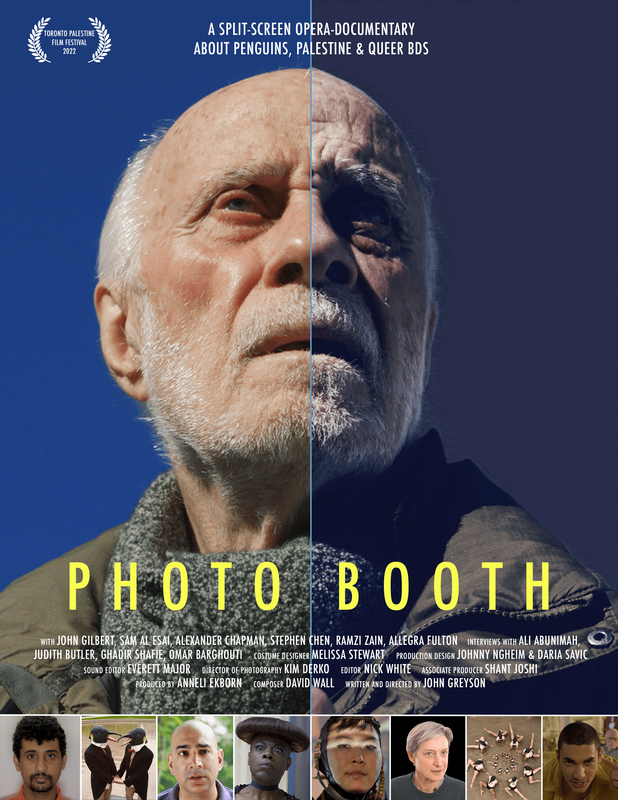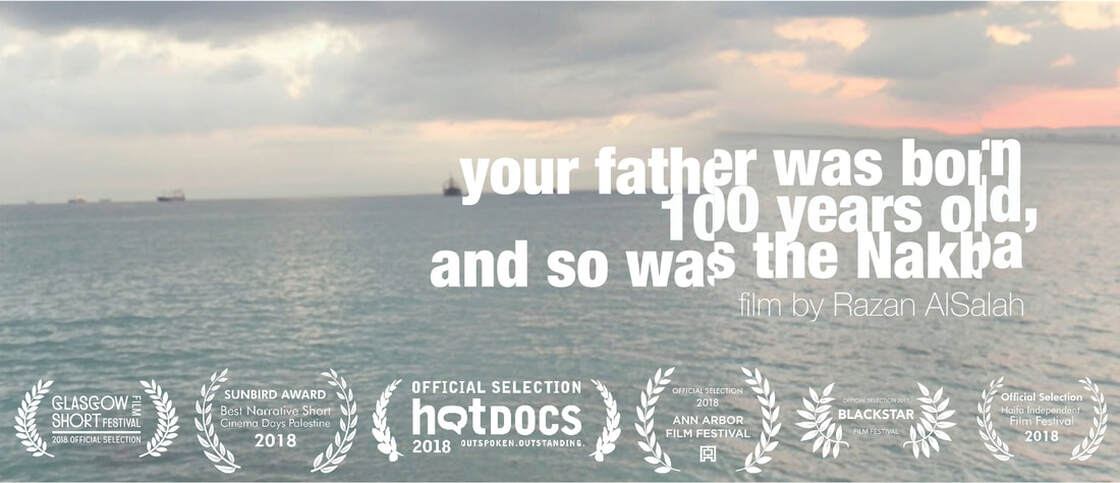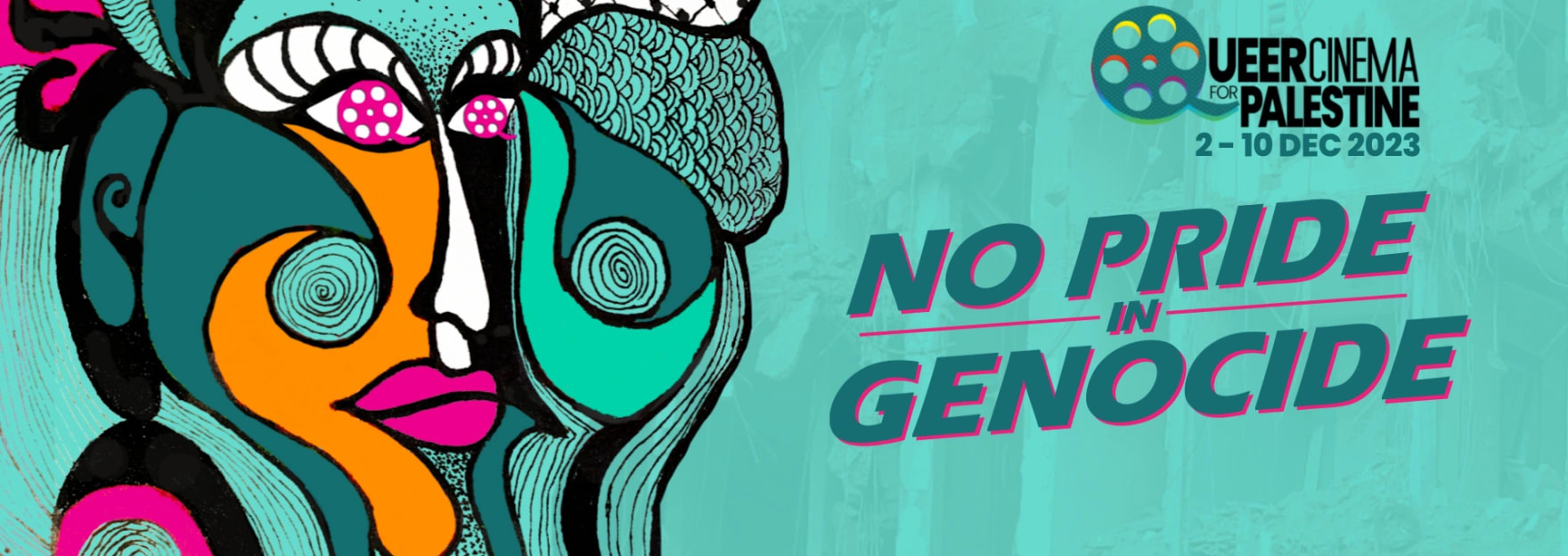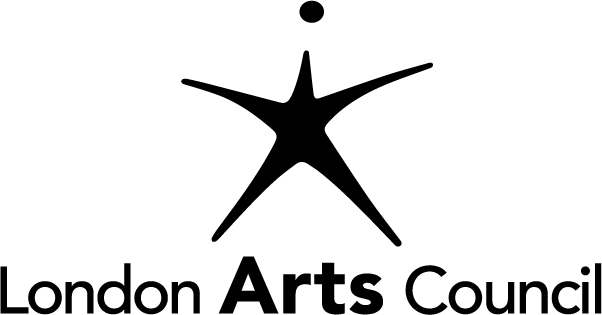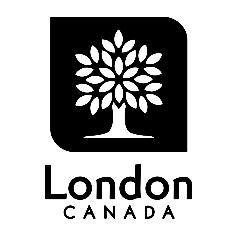Queer Cinema for Palestine:
“No Pride in Genocide"
Photo Booth, Solidarity, and Journeys Across Borders
A Screening and Conversation with John Greyson, Michael Lynk and Tarek Loubani
December 10, 2023 - International Human Rights Day
Organized by Jamelie Hassan and Iraboty Kazi
|
On the 75th anniversary of the United Nations Declaration of International Human Rights Day, the Embassy Cultural House presented an afternoon screening of Canadian director, activist, and artist John Greyson's powerful, experimental documentary, Photo Booth (2022) at University College, Western University, London, Ontario. This event marks the ECH's second time participating in Queer Cinema for Palestine since the inaugural festival in 2021. This year's event, programmed under the banner of “No Pride in Genocide,” took place in London, UK, Toronto, Montreal, Vancouver, Berlin, Amsterdam, Beirut and Seoul, and closed with London, Ontario.
|
|
Professor David Heap, on behalf of People for Peace, introduced John Greyson and the film, which was supported by Western University's Film Department. Following the well-attended film screening and a dinner break at Barakat's, the evening conversation featured John Greyson and Michael Lynk—Professor Emeritus in the Faculty of Law at Western University and Special UN Rapporteur on the situation of human rights in the Occupied Palestinian Territories from 2016 to 2022. This conversation was moderated by their friend and activist, Dr. Tarek Loubani. The conversation was held at Conron Hall at Western University and introduced by ECH/QCP co-organizers Jamelie Hassan and Iraboty Kazi. Sara Rans of Independent Jewish Voices in London, ON, also participated in the opening remarks on behalf of the London chapter, who also supported this QCP program. Despite the cold and rain, the 70 guests who attended had a historic opportunity to hear from Tarek, John, and Michael about their experiences working in and on behalf of Palestine. Tarek introduced himself as John's prison cellmate, referring to when they were arbitrarily arrested in 2013 in Cairo and held in Tora Prison for seven weeks without charges. Tarek, a prominent Palestinian-Canadian doctor and humanitarian who works in war zones, including hospitals in Gaza, brought a powerful dimension to the conversation. Michael Lynk spoke on international law and human rights as it pertains to Israel's violations of Palestinians in Gaza and the Occupied Territories. All three involved in the conversation, while working internationally, have a strong history and connection to London's activist and cultural community.
Razan AlSalah’s 2017 short film, أبوكي خلق عمره ١٠٠ سنة، زي النك your father was born 100 years old, and so was the Nakba was also screened in conjunction with the conversation. Western's Department of Visual Arts provided technical support and London's Queer Muslims Association also contributed to the realization of this solidarity event. The title for the program came from a line of a poem by renowned Palestinian poet, Mahmoud Darwish (1941- 2008).
Razan AlSalah’s 2017 short film, أبوكي خلق عمره ١٠٠ سنة، زي النك your father was born 100 years old, and so was the Nakba was also screened in conjunction with the conversation. Western's Department of Visual Arts provided technical support and London's Queer Muslims Association also contributed to the realization of this solidarity event. The title for the program came from a line of a poem by renowned Palestinian poet, Mahmoud Darwish (1941- 2008).
FILM PROGRAM
The films screened during the Queer Cinema for Palestine program were available from December 2 to December 20, 2023.
|
PHOTO BOOTH
John Greyson, 2022, 1 hour 53 min Outraged by the latest bombing of Gaza, Palestinian queer activists Hamza and Walid recruit queer novelist Jean Genet to help them sabotage the Eurovision song contest in Jericho. Their method? Secure the collaboration of Buddy and Pedro, Toronto's famous gay penguins... The emergence of queer BDS (boycott, divestment, sanctions) as a dynamic Palestinian-led global movement is brought to vivid life through interviews and actions, opera and agitprop, protests and pranks. Recounting fifteen years of passionate activism in Toronto and worldwide, Photo Booth juxtaposes a surreal operatic narrative with documentary scenes that explore pride and pink-washing, gay soldiers and homo-nationalism, Queers Against Israeli Apartheid, and the accelerating weaponization of anti-Semitism. Queer activists Ghadir Shafie, Judith Butler, Ali Abunimah, and others recount the victories and set-backs of this emerging social justice movement. In his final performance, John Gilbert plays a bewildered Genet, attempting to engage with the digital queer activism of a new century, navigating the diverse challenges of megaphones and photo booths, twelve-tone and split-screen, frisbees and teargas, Gaga and Gaza. John Greyson is video/film artist and pioneer of the new queer cinema. Since 1984, his many hybrid features, shorts and transmedia works have explored such queer activist issues as police violence, prison, AIDS activism, solidarity, homo-nationalism and apartheid (both South African and Israeli). His videos/films have won 4 Teddy’s, 5 Canadian Screen Awards (Genies), and over 30 Best Film Prizes at international festivals, He also teaches at York University's Cinema & Media Arts department. |
أبوكي خلق عمره ١٠٠ سنة، زي النك your father was born 100 years old, and so was the Nakba
Razan AlSalah, 2018, 7 min
“A ghostly voice echoes: the disembodied, imaginary voice of the filmmaker’s grandmother, a Palestinian refugee in Lebanon who was never able to return to her hometown. Her words haunt Google Street View images of Haifa, the only means she could have had of visiting her lost home. But 50 years after the “great catastrophe,” the streets are no longer recognizable. The old woman’s soul wanders in vain through cyberspace in search of her house, probably demolished after the Nakba, and for her son Ameen, imagined as a little boy from another time. Over the images, which distort and pixilate as the network connection cuts in and out, are superimposed images of the trauma of forced relocation. Razan AlSalah pays heartbreaking tribute to the first generation of refugees." - Charlotte Selb, RIDM
Razan AlSalah is a Palestinian artist based in Tio'tia:ke/Montreal investigating the material aesthetics of dis/appearance of places and people in colonial image worlds. Her work has shown at Art of the Real, Prismatic Ground, RIDM, HotDocs, Yebisu, Melbourne, Glasgow and Beirut International, Sharjah Film Forum, IZK Institute for Contemporary Art and Sursock Museum. Razan teaches film and media arts at Concordia University.
Razan AlSalah, 2018, 7 min
“A ghostly voice echoes: the disembodied, imaginary voice of the filmmaker’s grandmother, a Palestinian refugee in Lebanon who was never able to return to her hometown. Her words haunt Google Street View images of Haifa, the only means she could have had of visiting her lost home. But 50 years after the “great catastrophe,” the streets are no longer recognizable. The old woman’s soul wanders in vain through cyberspace in search of her house, probably demolished after the Nakba, and for her son Ameen, imagined as a little boy from another time. Over the images, which distort and pixilate as the network connection cuts in and out, are superimposed images of the trauma of forced relocation. Razan AlSalah pays heartbreaking tribute to the first generation of refugees." - Charlotte Selb, RIDM
Razan AlSalah is a Palestinian artist based in Tio'tia:ke/Montreal investigating the material aesthetics of dis/appearance of places and people in colonial image worlds. Her work has shown at Art of the Real, Prismatic Ground, RIDM, HotDocs, Yebisu, Melbourne, Glasgow and Beirut International, Sharjah Film Forum, IZK Institute for Contemporary Art and Sursock Museum. Razan teaches film and media arts at Concordia University.
Presented by the Embassy Cultural House in collaboration with Queer Cinema for Palestine and with the support of the Department of Visual Arts at Western University, the Department of Film Studies at Western University, People for Peace, London, ON, Independent Jewish Voices, London, ON, and London's Queer Muslims Association.
Queer Cinema for Palestine is organized by Aswat – Palestinian Feminist Center for Sexual and Gender Freedoms, the Toronto Queer Film Festival and the Palestinian Campaign for the Academic and Cultural Boycott of Israel, together with dozens of partners around the world.
Queer Cinema for Palestine is organized by Aswat – Palestinian Feminist Center for Sexual and Gender Freedoms, the Toronto Queer Film Festival and the Palestinian Campaign for the Academic and Cultural Boycott of Israel, together with dozens of partners around the world.

